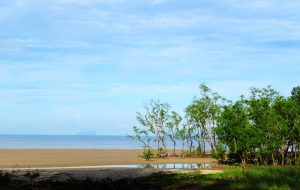The Luconia Shoals are located in the South China Sea, around 100 kilometers off the coast of the Malaysian state of Sarawak. Some geographers classify the shoals as the southernmost part of the disputed Spratly Islands, which are claimed by China, Taiwan, Malaysia, Brunei, Vietnam, and the Philippines.
Malaysia has enjoyed sovereignty over the Luconia Shoals, which lie within its 200-nautical-mile Exclusive Economic Zone (EEZ), since 1963, when Sarawak and the neighboring state Sabah joined the Federation of Malaya to form modern day Malaysia. Sarawak considers the shoals to lie within its territorial waters and in 2018 declared the area a national park. In 1974, the Federal Government incorporated the national oil company Petronas and vested in it the rights to explore and produce oil and gas in the offshore areas lying within Malaysia’s territorial waters, and extended this to include Malaysia’s EEZ. The area around the shoals is considered commercially prospective for oil and gas and Petronas conducts development and exploratory activities in and around the area.
Petronas and its production sharing contractors have enjoyed relatively unhindered commercial access in the area, until 2015, when Beijing dispatched the China Coast Guard to the area around Luconia Shoals to assert its expansive “nine-dash line,” which lays claim to the majority of the South China Sea. Malaysia lodged diplomatic protests but the matter came to a head later that year when an Australian salvage operator licensed by the Sarawak state government, annoyed by Chinese interference in its salvage operations near the shoals, planted the Malaysian flag on the shoals as a warning to the Chinese.
The reaction of the Malaysian government, then led by Prime Minister Najib Razak, was strange, to say the least. Rather than encourage or defend this defiant assertion of Malaysian sovereignty, Malaysian customs warned off the salvage operator, and later, when the flag was removed by persons working for or with the Chinese government, did nothing. When Najib’s government fell in 2018, the new administration led by Prime Minister Mahathir Mohamad was believed to have taken steps toward reasserting Malaysia’s sovereignty over the Luconia Shoals, but the short-lived tenure of that administration seems to have brought those efforts to an end.
In March of this year, the current prime minister, Anwar Ibrahim, appeared to fall back to the position taken by the Najib administration. Speaking at the ASEAN-Australia Special Summit in Melbourne, the Malaysian leader said that he did not have any problem with China, and warned the United States and Australia to keep their problems with China to themselves. “If they have problems with China,” Malaysia’s The Star reported him saying, they should not impose them upon us. We do not have a problem with China.”
He did so while the China Coast Guard continued aggressively to patrol in and around the shoals.
A year prior to that declaration, Anwar caused confusion in Malaysia when, following a state visit to China, he addressed Parliament about his discussions with Chinese leaders. “I stressed… that Malaysia sees the area as Malaysian territory therefore Petronas will continue its exploration activities there,” Anwar said. He added that “if China feels this is their right, Malaysia is open to negotiations.”
That remark marked a departure from the policy of previous administrations, including the Najib administration, which never spoke of negotiations with China as an avenue for addressing disputes in the South China Sea. Malaysia has instead pursued a policy of asserting sovereignty by building its own installations in the South China Sea while using international instruments, notably a protest submitted to the United Nations in 2019, to defend its claims. Importantly, Petronas has continued awarding and extending existing production sharing contracts regardless of any claims by China over the areas concerned.
Why Anwar chose to depart from Malaysia’s past policy remains unclear. However, given Anwar’s equivocation with regards to China’s claims, and the Najib administration’s refusal to assert Malaysia’s authority over the Luconia Shoals, Malaysia appears not to be challenging China’s claim over the shoals. This is rather strange, for in the case of Pedra Branca, which was heard by the International Court Of Justice (ICJ) in 2007, Malaysia lost its claim because the ICJ found that while Singapore had done much to administer the island, Malaysia had done nothing.
Importantly, in the prior dispute between Malaysia and Indonesia over Pulau Ligitan and Pulau Sipadan, the ICJ decided in favor of Malaysia because the activities undertaken by Malaysia on the islands were diverse in character and included legislative, administrative, and quasi-judicial acts, which covered a considerable period of time and showed a pattern revealing an intention to exercise state functions in respect of the two islands in the context of the administration of a wider range of islands. The ICJ noted that Indonesia nor its predecessor, the Netherlands neither disagreed nor protested these activities.
Therefore, it is in Malaysia’s interests to ensure that it conducts activities in and around the Luconia Shoals that are diverse in character, and sanctioned or licensed by the federal and Sarawak state governments. This could include re-activating the salvage works interrupted by the China Coast Guard and intensifying oil and gas exploration and, where viable, production activities in and around the Shoals.
Since the Luconia Shoals sit just above the southern tip of the “nine-dash line,” any advantage China gains over the shoals is likely to strengthen its control over the entire area of its territorial waters bound by the line. It is therefore in the interest of other claimants and interested parties to ensure that Malaysia takes decisive steps to assert its sovereignty. That may be accomplished within existing defense arrangements, such as the Five Power Defense Agreement (FPDA), perhaps by including the shoals in the next FDPA Bersama Shield and Bersama Lima exercise.

































